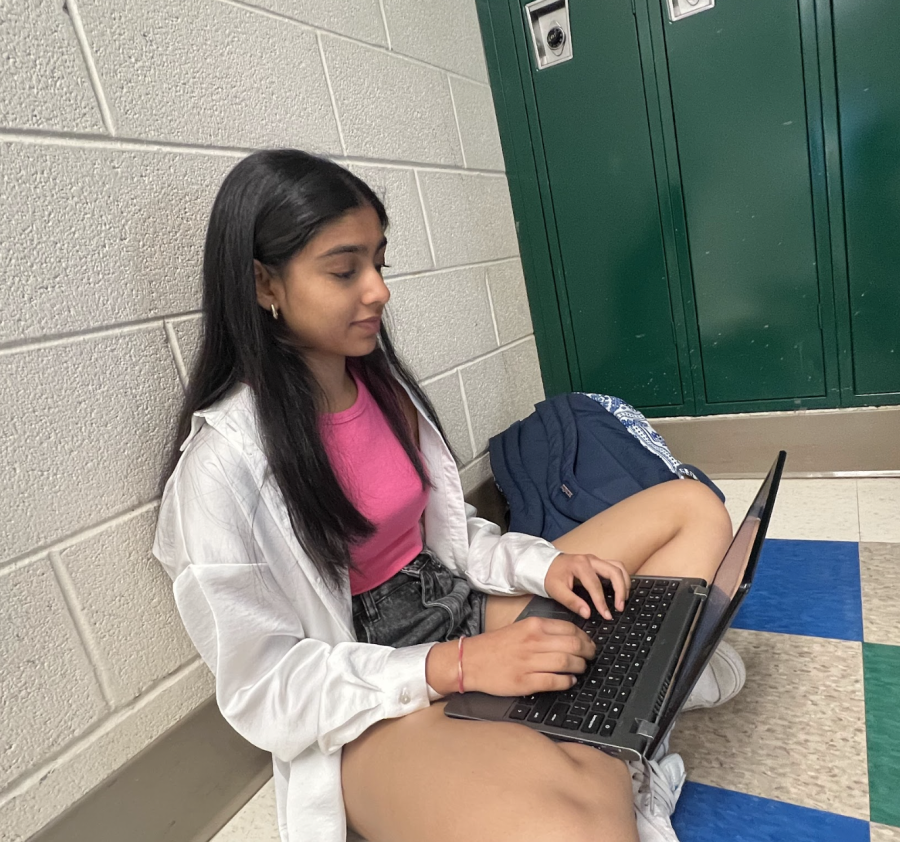Tips for success: how to prepare for AP exams
WCHS sophomore Eva Lee, a visual learner is reviewing a topic for her AP class by looking at a picture that provides a demonstration on April 16, 2023.
May 1, 2023
Papers with black bold letters titled “practice sheet” or “study guide” blanket the table where a student attempts to study. The bright light coming from their school computer spotlights their guilty procrastination. Their eyes are entrapped by notifications from their friends and social media apps buzzing. Sophomore, Saniya Shah, understands the incomparable sense of relief her phone provides despite its detriment to her preparation for the upcoming AP exam.
“I feel like it’s really difficult to concentrate while I’m trying to study because even though I want to ignore the distractions there’s this one part of me that also wants to ignore my studies and put it off because it’s so overwhelming,” Shah said.
A student building good consistent study habits depend on what type of learner they are. For example, if someone is a visual learner, they will comprehend information faster with images rather than words explaining the concept of the picture. However, visual learning is just one of the four different types of educational styles; others include kinesthetic, auditory and reading and writing.
“Personally, I would say I’m a reading and writing learner because I’ve noticed that I absorb information faster because I’m good at taking notes while reading passages or excerpts I’m assigned,” Shah said.
While a student establishing their type of learning style holds some precedence, another important factor is figuring out how much time they need to dedicate to this course. Taking AP courses requires considerably more commitment than regular or honors courses because the voluminous amount of material is not only dense but also intellectually challenging.
“My biggest weakness is how often I procrastinate on my assignments. Normally I can get away with it in my regular classes but because my AP classes require more of my attention I’ve become more responsible meeting deadlines. However one of my strengths is how organized I am so I can schedule which days I’m going to spend hours studying,” sophomore Brooke Roberts said.
Students who study at the last minute and fail usually do not have the best memorization skills or can not comprehend the information quickly enough. Creating flashcards helps these individuals because it allows them to memorize information faster and the topics stick better. According to “How To Prepare For AP Exams” from Best Colleges, students typically start studying between January and March. This gives them enough time to cover all the material, take AP prep courses, take practice tests and develop an AP test strategy. These are the types of preparations students should be taking if they want to succeed on the AP exam.
“Ever since I realized why I procrastinate, I’ve been studying for at least two hours each day using the resources my teacher has provided for me as well as AP classroom online since they have useful videos that have supported the information I’ve been retaining throughout the school year,” Roberts said.
It is not uncommon for students at WCHS to set high standards for themself yet fall short of their expectations, unsurprisingly. However, it is not ever too late for them to course correct to prepare for their upcoming AP exam. Which is what Shah and Roberts have been setting an example for, by pinpointing what diverts them from their studies and removing it.
Here are some tips depending on which type of student an individual is:
Students who study at the last minute and perform well – Be more organized, create a schedule that emits punctuality, match a studying style that paces the class. However, this habit can lead to one failing classes, which can turn into a bad cycle of procrastination.
Students who do not study at all – Set realistic goals for yourself that will motivate you to study the material you’re assigned more. For example, start studying 15 minutes each day and then slowly build up that number as the class advances in the topic, which will eventually lead to a test.



